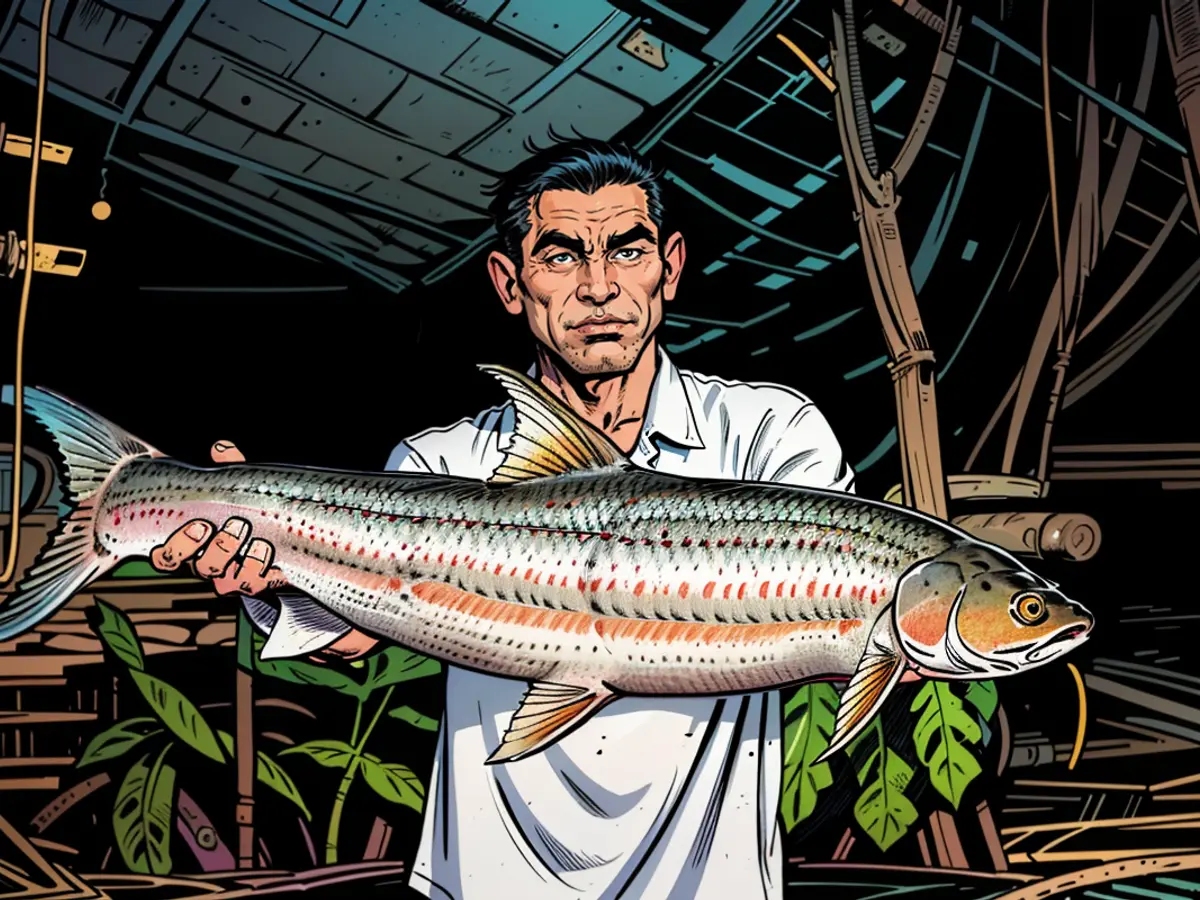Researchers harbored concerns that the gigantic "spectral" fish species had vanished permanently. However, it recently resurfaced following a prolonged absence of almost two decades.
Photos of the fish and its unique characteristics – an irregularly shaped mouth and a prominent projection at its jaw – appeared to verify its identity.
However, the fish, capable of growing up to 66 pounds, was sold before researchers had the opportunity for a closer examination. It didn't provide "absolute evidence," stated Zeb Hogan, a research biologist at the University of Nevada, Reno and head of the US-funded Wonders of the Mekong project, a venture to investigate and preserve the world's most biodiverse river.
Three years later, fortune struck.
Cambodian fishermen caught two fish in the Mekong River, weighing between 11 and 13 pounds and measuring between 2 and 3 feet long. This time, researchers managed to acquire and examine the fish themselves.
"Despite the fishermen not having encountered the fish before, they recognized that they had something extraordinary, unusual. They knew it was worth reaching out to us," said Hogan, part of an international team of scientists collaborating with the Cambodian fisheries department, during an interview with CNN.
"As soon as anyone involved in the search for this fish looked at the photos, we recognized what it was."
The researchers published their findings in a study published on Tuesday in the Biological Conservation journal.
The discovery was a moment of jubilation for the team, dedicated to protecting the Mekong, one of the world's longest rivers and a lifeline for tens of millions of people.
Meaning "Mother of Rivers" in Thai and Lao languages, the Mekong traverses numerous Southeast Asian countries and is renowned for its biodiversity.At the same time, the river faces various challenges including hydropower development, overfishing, and habitat degradation.
These challenges have led experts to worry that the "Mekong Phantom," a critically endangered giant salmon carp that can grow up to 4 feet long, had likely become extinct as years passed without a sighting.
Veiled in mystery
The fish, native to the Mekong, has been enshrouded in mystery since it was formally named in 1991. Since then, fewer than 30 individuals have been recorded, making it a highly uncommon species, according to a press release from the University of Nevada, Reno.
Hogan's team of researchers – who also study other species and parts of the Mekong’s environment – have been on the lookout for the giant salmon carp, scouring fish markets and conducting outreach programs with local fishermen. Hogan himself, an expert in studying fish in the Mekong River Basin, has only spotted it once in the early 2000s.
"I've been looking for it since then, intrigued by it because it's an unusually big fish," Hogan said. "I believed it was probably extinct, and so to learn that it had been found again – I've been waiting 20 years for that news."

"It's a beacon of hope," he added. "It means it's not too late."
The study's primary author, Bunyeth Chan from Cambodia’s Svay Rieng University, echoed this sentiment, stating in a press release: "The rediscovery of the giant salmon carp is a reason for hope, not just for this species but for the entire Mekong ecosystem."
There's still a lot that researchers don't know, such as the population size of giant salmon carp or where their habitats are located.
The three fish that were found between 2020 and 2023 were discovered outside of their typical range – which could indicate the presence of undiscovered populations or their migration from neighboring Laos and Thailand.
And even though it's unusual to find three individual fish in quick succession after the species disappeared for nearly two decades, Hogan credits this to their efforts on the ground – building strong relationships with local communities who know to alert them when they come across anything unusual.
But researchers maintain that more needs to be done as the Mekong faces numerous threats, including climate change, with the region experiencing increasingly severe flooding and drought each year.
Human projects such as hydropower dams and sand mining have further degraded marine habitats and disrupted the lives of the Mekong's over 1,100 fish species, many of which can only be found in the Mekong.
Nearly a fifth of the Mekong's fish are at risk of extinction, according to a report released in March this year, a collaboration between 25 organizations including the World Wildlife Fund and Wonders of the Mekong.
Cambodia is not an easy place to be an environmental advocate. Many have been imprisoned or killed over the years as they speak out against corruption and businesses that harm the environment in a nation with limited political opposition.
Earlier this year, 10 young activists from the group Mother Nature Cambodia were sentenced to up to six years in prison, each on charges of conspiring against the state, a conviction condemned by opposition politicians in exile and prominent youth environmentalist Greta Thunberg.
Researchers behind the latest report hope that the giant salmon carp's rediscovery can generate momentum for further study and conservation efforts – including establishing an international team across Cambodia, Laos, and Thailand to study the "Mekong Phantom" more closely.
“This fish is a sign of river health because it’s a large fish, it’s vulnerable,” said Hogan.
“But it’s also a symbol of all the other fish that exist in the area, which are crucial fishery species and provide important food sources for local communities.”

The discovery of the two fish in the Mekong River sparked interest among the international team of scientists, as they recognized its unusual nature despite the fishermen not having encountered it before. The findings of the three fish, which were published in the Biological Conservation journal, brought hope for the preservation of the Mekong, a biodiverse river that faces various challenges like hydropower development and overfishing.
As the Mekong River, known as "Mother of Rivers" in Thai and Lao languages, traverses numerous Southeast Asian countries, protecting its wildlife, including endangered species like the 'Mekong Phantom,' has become a critical concern for experts and environmental advocates.







